New York City Democratic mayoral candidates at their first debate on June 4. Photo by Yuki Iwamura-Pool/Getty Images
New York City’s Jews have always been influential in its politics. Ahead of this week’s Democratic mayoral primary – and beyond, into the November general election – they have emerged as a defining factor.
Former Gov. Andrew Cuomo started fighting antisemitism while exploring a bid for mayor then launched his primary campaign in March by prioritizing it as urgent amid campus activism and the far left’s attacks on Israel.
The primary campaigning now ends with Zohran Mamdani, a Democratic Socialist and outspoken critic of Israel, surging in a dead heat with Cuomo in the final stretch.
Every leading candidate has faced questions in public forums and in televised debates about their positions on the Gaza war. Independent groups backing Cuomo — funded by Jewish billionaires, including Bill Ackman and Mike Bloomberg — have targeted Mamdani over his statements on Israel. The Jewish candidates in the race, New York City Comptroller Brad Lander and his predecessor Scott Stringer, have cursed their rivals in Yiddish. Outreach to Hasidic voting blocs intensified. Plans to combat antisemitism have proliferated in campaign platforms.
New York City is home to more Jews than any other city outside of Israel. More than 700,000 Jewish adults have typically made up about 16% of the Democratic primary electorate.
Here’s a look at the key Jewish moments in the race.
Eric Adams’ struggle and hope
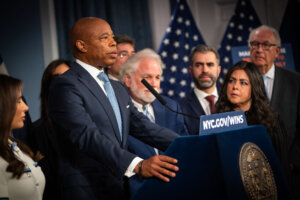
A crowded field of challengers taking on an incumbent mayor is rare in New York City politics. The last time it happened was in 1989, when Ed Koch, the city’s iconic Jewish mayor, lost the Democratic primary to David Dinkins, who went on to become New York’s first Black mayor.
Eric Adams, the embattled current mayor, is in an especially unusual position. After facing resignation calls amid federal bribery and fraud charges — later dismissed by President Donald Trump’s Justice Department — Adams opted out of the Democratic primary and launched an independent ballot line.
Before he went independent, Adams invoked Adolf Hitler’s manifesto, Mein Kampf, in lashing out at his rivals. “That is what you’re seeing right there, right now — a modern-day Mein Kampf,” Adams told supporters at a Brooklyn church in February. “If you tell lies long enough, loud enough, people will tend to believe it is true,” Adams said, echoing a concept described by the Nazi leader in the book detailing his political beliefs.
Orthodox voting blocs were critical to electing Adams in 2021. He has maintained his popularity with Jewish New Yorkers for his strong pro-Israel stance. He declared himself a “modern-day Maccabi” at a pre-Hanukkah party he hosted at Gracie Mansion in December.
Last month, Adams announced the creation of a new office to combat antisemitism, which some of his rivals decried as a “cynical” move to promote the independent line he named for the ballot, “End Antisemitism.” He also signed an executive order adopting the controversial International Holocaust Remembrance Alliance definition of antisemitism, which considers most forms of anti-Zionism as antisemitic.
Whether Cuomo, haunted by allegations of sexual misconduct, which he denies, wins the primary or Mamdani pulls an upset, Adams is hoping a fractured electorate and a crowded field in November will fuel a comeback. He will be relying on his 2021 coalition of Orthodox, Black and Asian voters for a win.
Andrew Cuomo’s Hasidic endorsements
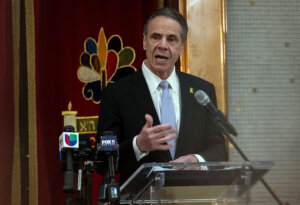
All the candidates invested heavily in outreach to Orthodox leaders or voting groups in recent months. Among those soliciting Orthodox support were Mamdani, Lander, Stringer, Council Speaker Adrienne Adams, State Sen. Zellnor Myrie, hedge fund investor Whitney Tilson and Michael Blake.
But it was Cuomo who succeeded in consolidating support from all major Orthodox groups, securing a last-minute first place endorsement from every Hasidic voting bloc in Brooklyn.
His path was far from smooth. Cuomo had faced backlash for singling out Hasidic communities for enforcement during the COVID-19 pandemic.
Still, his early frontrunner status, aggressive outreach, public expression of “deep regret” for past actions as governor, and growing fears of a Mamdani victory led Hasidic leaders and yeshiva administrators to rally behind him. Their backing could prove crucial, potentially giving Cuomo the edge in the final round of ranked-choice voting, especially if turnout is high.
Cuomo was warmly received on Sunday during his only public campaign stop in Borough Park.
He also made fighting antisemitism a focal point of his candidacy. He called it “the most serious and the most important issue” in the campaign.
A weak ground operation, surging enthusiasm for Mamdani, and a sharp rise in new voter turnout could all undercut Cuomo’s chances.
Zohran Mamdani’s rise and the blowback
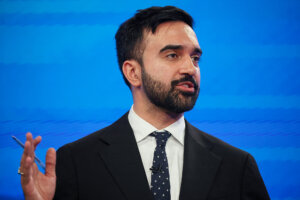
Mamdani, 33, took a rapid path from three-term state legislator with a minimal record of achievements to leading progressive contender, bypassing more seasoned politicians. His record on Israel, including his support for the Israel boycott movement and a recent defense of the phrase “Globalize the Intifada,” has sparked significant backlash.
Cuomo accused Mamdani of “enabling the forces of antisemitism” through his affiliation with the New York City chapter of the Democratic Socialists of America, widely condemned for defending the Oct. 7, 2023, Hamas attacks on Israel at a demonstration in Times Square a day later.
Mamdani, who is Muslim, first made his case to Jewish voters over a bowl of chicken soup at a Manhattan diner during an April interview with the Forward, describing his positions as driven by a commitment to universal human rights.
He also met with skeptical Jewish leaders and gave an interview to a Hasidic Yiddish-language paper. Over the weekend, photos circulated on social media showing pro-Mamdani Yiddish language campaign posters on a pole in Borough Park. His campaign did not confirm whether it sanctioned the posters.
Mamdani came under fire for declining to co-sponsor resolutions earlier this year recognizing Israel’s independence and commemorating the Holocaust. He also faced backlash from his hard-line anti-Israel base for saying Israel has a right to exist.
He declined to recognize Israel specifically as a Jewish state and said he would refuse to visit the country as mayor. “I’m not comfortable supporting any state that has a hierarchy of citizenship on the basis of religion or anything else,” Mamdani said in a TV interview.
Mamdani told a Muslim outlet that he has been “the foremost advocate” for Palestinian human rights. In appearances at local mosques, he labeled Israel’s exploding pager operation against Hezbollah operatives in Lebanon last September as a targeted attack against civilians.
A Jewish woman confronted Mamdani while canvassing in Harlem, telling the candidate, “You’re going to lose the election because you don’t support Israel enough.”
The fiercest backlash came in recent days after Mamdani justified the phrase “Globalize the Intifada” as a call for Palestinian human rights. The U.S. Holocaust Museum issued a rare statement disputing his claim that the phrase appeared in its Arabic translation of the Warsaw Ghetto Uprising, though Mamdani was not entirely wrong.
Jewish groups and members of Congress condemned Mamdani. In a radio interview on Monday, Mamdani maintained that he hasn’t used the phrase and it wasn’t his job to police controversial statements.
Brad Lander’s Yiddish curses
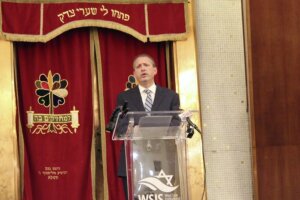
Lander, who as comptroller is the city’s highest-ranking Jewish elected official, frequently invoked his Jewishness on the campaign trail. He deployed Yiddish curses against political rivals who questioned his commitment to Israel.
“A beyzer gzar zol er af dir kumen,” Lander said, denying Cuomo’s claim that Lander had divested from Israel bonds. The Yiddish curse means “may an evil decree come upon him.” Mayor Adams wasn’t spared either. After hearing that Adams attacked his Israel record, Lander responded, “Gay kaken afn yam,” Yiddish for “go poop in the ocean.”
Lander dropped Talmudic references, Yiddish proverbs and Hebrew phrases in a speech courting Orthodox voters. He distinguished his liberal Zionist views from those of “both the left and the right” who have either excused the Oct. 7 Hamas attacks or minimized Palestinian suffering.
In March, Lander unveiled a public safety plan that includes measures to curb the rise in antisemitism. And last week, he got national attention for being arrested while trying to shield an undocumented immigrant from the Trump administration’s practice of courthouse detentions.
Lander also picked up endorsements from iconic Jewish cultural figures Ilana Glazer and Fran Lebowitz.
Scott Stringer’s bar mitzvah naches
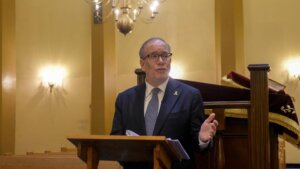
Stringer, a former city comptroller, also highlighted his Jewish identity. In remarks at the West Side synagogue in April, Stringer said his Jewish faith has guided him and given him strength as an elected official.
In December, he celebrated the bar mitzvah of his oldest son, Max, and said he was considering holding his younger son Miles’s bar mitzvah in Israel.
Stringer toured Jewish businesses in the heart of Borough Park and touted his moderate views on the Israeli-Palestinian conflict. He called himself a proud Zionist and labeled the Boycott, Divestment and Sanctions movement as antisemitic.
Adrienne Adams’ planned trip to the Holy Land
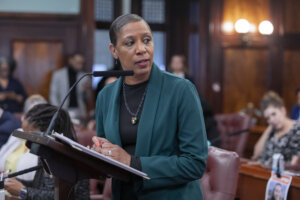
The Council Speaker, who shares the same surname as the mayor but is not related to him, honed in on specific Orthodox asks during the campaign.
At a mayoral forum on Jewish issues, co-hosted by the liberal New York Jewish Agenda, Adams strongly defended Hasidic yeshivas under scrutiny in recent years for failing to meet state education standards. At a UJA-Federation town hall last month, Adams pledged to create a deputy mayor for Jewish affairs and antisemitism, a first-of-its-kind role.
In a televised debate, she vowed to make Israel her first international trip as mayor, calling it “the Holy Land.” In 2020, Adams broke with tradition and declined to lead an educational mission to Israel. The trips, sponsored by the Jewish Community Relations Council of New York, have historically been led by the chamber’s speaker for the past three decades. She explained it was a scheduling conflict.
“The first thing that I am going to do is prioritize my trip to the Holy Land — that is what I call Israel,” Admas said earlier this month.
Adams briefly locked down a critical bloc of Orthodox votes when more than two dozen Hasidic sects in Borough Park ranked her as their first choice. She said she connected with the school administrators through her passion for education. It didn’t last long, though. A week later, the coalition flipped its support to Cuomo following a meeting with the former governor.
Michael Blake’s walkback on Israel
Michael Blake, a former state legislator who is polling below one percent, walked back a statement made on Oct. 13, 2023 that Israel was committing genocide in Gaza. “It was wrong language to use,” Blake told the Forward in May.
Blake cross-endorsed Mamdani last week. In a phone interview following his announcement, Blake said he doesn’t agree with Mamdani on Israel. “I’ve always stated that Israel has a right to defend itself,” Blake said.
Zellnor Myrie’s bread and butter appeal
Myrie, a state senator representing several heavily Jewish neighborhoods in central Brooklyn, directly appealed to Orthodox voters by focusing on affordable housing, taxes, education and public safety. He scored second or third place in some ranked-choice slates recommended by Hasidic groups.

